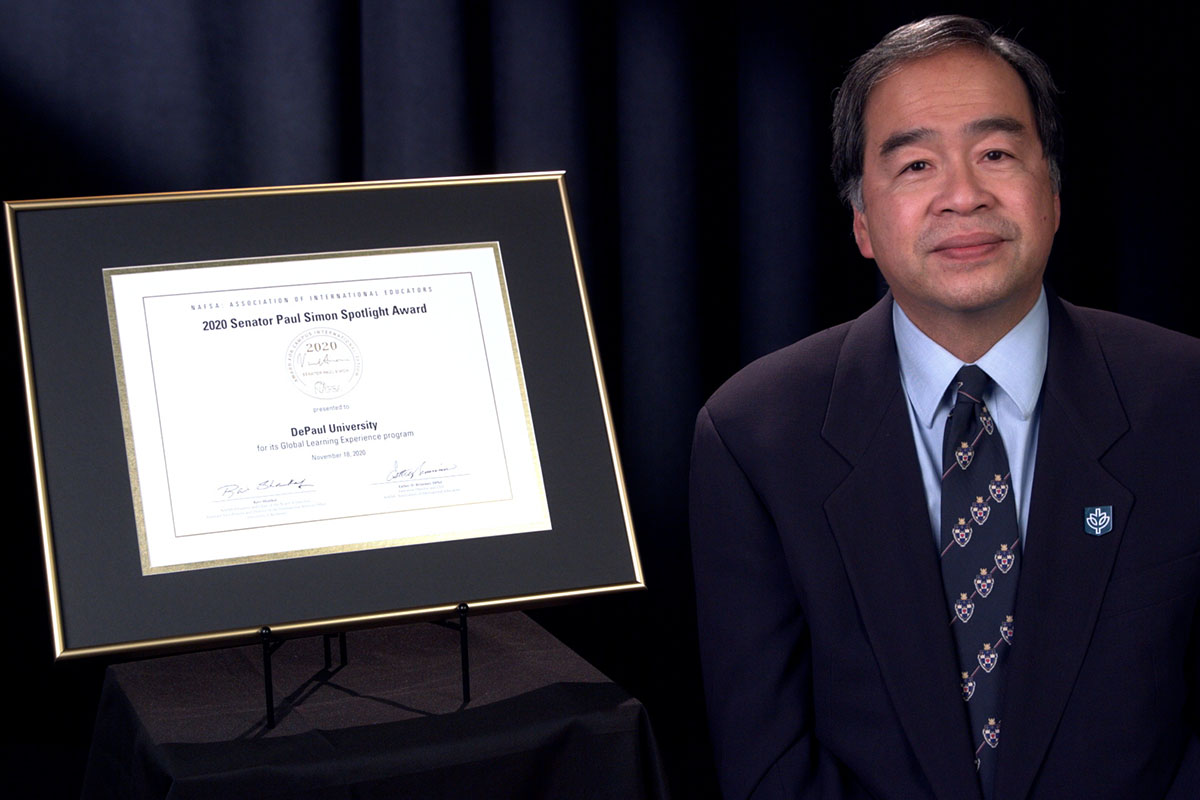 (DePaul University/University Marketing and Communications)At a time when global political discourse can be strained or even hostile, higher education must be a model of building bridges between nations. Global learning not only gives students the opportunity to experience different cultures, it also allows them to be mindful of different perspectives – a critical skill for professional and personal success.
(DePaul University/University Marketing and Communications)At a time when global political discourse can be strained or even hostile, higher education must be a model of building bridges between nations. Global learning not only gives students the opportunity to experience different cultures, it also allows them to be mindful of different perspectives – a critical skill for professional and personal success.
Yesterday, I had the distinct honor of accepting the 2020 Senator Paul Simon Spotlight Award for Campus Internationalization on the behalf of the DePaul community. The association of international educators – NAFSA – presented DePaul with this award for our innovative program, the Global Learning Experience.
At DePaul, we make it a priority to prepare all students for global citizenship and success. Our global engagement strategy follows directly from this priority, where the emphasis is on all students. For years, the Global Learning Experience, or GLE, has allowed us to significantly expand access to transformative, intercultural experiences in a more equitable way.
From health sciences in Ghana to sound design in Scotland to robotics in Brazil, DePaul's GLE programs allow faculty and students from around the globe to collaborate on joint projects and interact with classrooms in other countries – all without the time and expense of travel.
Historically, DePaul has been successful in giving low-income and first-generation college students access to study abroad programs. Only a small percentage of DePaul students, however, study abroad each year. In fact, before the pandemic, we had as many DePaul students taking a GLE course as we sent abroad for short-term faculty-led programs. The GLE essentially allowed us to double our reach with short-term intense international experiences.
More than 2,400 DePaul students have participated in 155 GLE classes with partners in 31 different countries since the program started in 2013. Well before Zoom and other similar platforms became our way of life, DePaul faculty were using technology as a bridge to enable international education.
A typical GLE project lasts 6 to 8 weeks and is part of a regular DePaul class, meaning there is no additional fee or expense for our students. Most projects have asynchronous and synchronous components. Some GLE classes use Zoom to connect via video. Other projects use texting apps, such as WhatsApp or WeChat, which have the added benefit of offering the possibility to use electronic translators to eliminate some of the language barriers. Collaborative work is a central component of every course, and students have the flexibility to schedule meetings when it works for their group, making it easier to manage different time zones.
Why is global learning important? Through programs like the GLE, DePaul students are gaining 21st-century skills that will allow them to excel academically, personally and professionally.
Now that we're all using synchronous web-based collaboration tools, companies around the world are reconsidering their approach toward remote work. Information technology companies have known and leveraged for a long time the advantages of a globally diffused workforce that can take advantage of different time zones. Other sectors of the economy are evaluating these advantages as well.
The pandemic has only accelerated the world's awareness of the need for global collaboration. The ability to be productive and effective in a multicultural virtual team is becoming essential to the workforce. As the world is rapidly changing, we believe that DePaul's international programs increase the employability of our students.
A Simon Award recognizes innovation and accomplishment in campus internationalization. It's named after the late U.S. Senator Paul Simon of Illinois, who was a strong advocate for international education and cross-cultural learning. Many dedicated faculty and staff at DePaul contribute to the success of our global learning programs. The Simon Award is a true affirmation of their hard work.
In an interconnected globalized society, a quality education must reflect the complexity of cultural issues, the diversity of opinions and especially the appreciation for difference. Virtualization of global learning has been key for DePaul to continue its trajectory of internationalization.